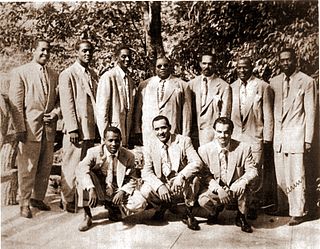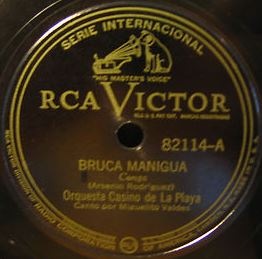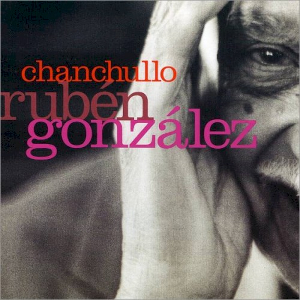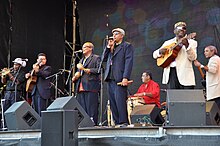
Arsenio Rodríguez was a Cuban musician, composer and bandleader. He played the tres, as well as the tumbadora, and he specialized in son, rumba and other Afro-Cuban music styles. In the 1940s and 1950s Rodríguez established the conjunto format and contributed to the development of the son montuno, the basic template of modern-day salsa. He claimed to be the true creator of the mambo and was an important as well as a prolific composer who wrote nearly two hundred songs.

Rubén González Fontanills was a Cuban pianist. Together with Lilí Martínez and Peruchín he is said to have "forged the style of modern Cuban piano playing in the 1940s".

Afro-Cuban All Stars is a Cuban band led by Juan de Marcos González. Their music is a mix of all the styles of Cuban music, including bolero, chachachá, salsa, son montuno, timba, guajira, danzón, rumba and abakua.
Son cubano is a genre of music and dance that originated in the highlands of eastern Cuba during the late 19th century. It is a syncretic genre that blends elements of Spanish and African origin. Among its fundamental Hispanic components are the vocal style, lyrical metre and the primacy of the tres, derived from the Spanish guitar. On the other hand, its characteristic clave rhythm, call and response structure and percussion section are all rooted in traditions of Bantu origin.

Ramón "Mongo" Santamaría Rodríguez was a Cuban percussionist and bandleader who spent most of his career in the United States. Primarily a conga drummer, Santamaría was a leading figure in the pachanga and boogaloo dance crazes of the 1960s. His biggest hit was his rendition of Herbie Hancock's "Watermelon Man", which was inducted into the Grammy Hall of Fame in 1998. From the 1970s, he recorded mainly salsa and Latin jazz, before retiring in the late 1990s.

World Circuit is a British world-music record label, established in London in the mid-1980s, that specializes in Cuban and West African recording artists, among other international music stars. The label's founding principle was to be an artist-led company with all aspects of each release tailored to the artist. This continues to be the label's way of working. World Circuit celebrated its 20th anniversary in 2006 by releasing World Circuit Presents..., a 2-disc retrospective compilation album. In 2018, World Circuit was acquired by BMG Rights Management.

Introducing... Rubén González is the second studio album by Cuban pianist Rubén González. It was recorded at EGREM studios in Havana, Cuba, during April 1996, as the last of the sessions that also yielded the albums A Toda Cuba le Gusta and Buena Vista Social Club. It was released on September 16, 1997, through World Circuit, thus becoming González's international debut. The album reached number seventeen on Billboard Top Latin Albums. In 2014 it was awarded a diamond certification from the Independent Music Companies Association, which indicated sales of at least 200,000 copies throughout Europe.

Juan de Marcos González is a Cuban bandleader, musician and actor, best known for his work with the Buena Vista Social Club and in the 2021 Sony Pictures Animation film Vivo as the voice of Vivo's owner, Andrés.
Alfredo Rodríguez was a Cuban pianist who played Afro-Cuban music as well as Latin jazz. Born in Havana, his musical career began in New York, where he struggled to establish himself, playing with dozens of Latin music groups over two decades. In 1983, he moved to Paris, where he enjoyed greater success, recording several albums as a leader to critical acclaim. In his later years, he founded a new group, los Acerekó, featuring Tata Güines, Changuito and Joel Hierrezuelo among others.
Ignacio Berroa is a jazz drummer.
Federico Arístides Soto Alejo, better known as Tata Güines, was a Cuban percussionist, bandleader and arranger. He was widely regarded as a master of the conga drum, and alongside Carlos "Patato" Valdés, influential in the development of contemporary Afro-Cuban music, including Afro-Cuban jazz. He specialized in a form of improvisation known as descarga, a format in which he recorded numerous albums throughout the years with Cachao, Frank Emilio Flynn, Estrellas de Areito, Alfredo Rodríguez and Jane Bunnett, among others. In the 1990s he released two critically acclaimed albums as a leader: Pasaporte and Aniversario. His composition "Pa' gozar" has become a standard of the descarga genre.

Miguelito Valdés, also known as Mr. Babalú, was a renowned Cuban singer. His performances were characterized by a strong voice and a particular sense of cubanismo.

Das merkwürdige Verhalten geschlechtsreifer Großstädter zur Paarungszeit is a 1998 German romantic comedy film. It earned the director Marc Rothemund a Bavarian Film Award for "Best Young Director". It was the second highest grossing domestic film in Germany in 1998. The film is a comedy centering on the lives of eight Germans who long for sexual excitement.

"Bruca maniguá" is an afro-son composed by Arsenio Rodríguez in 1937. It was first recorded by Orquesta Casino de la Playa featuring Miguelito Valdés on vocals in June 1937. Ever since it has become a Cuban son standard, with famous versions by Abelardo Barroso, Sierra Maestra, Buena Vista Social Club and Ibrahim Ferrer. The song, which has been called "a landmark in the development of Cuban popular music" by Ned Sublette, was Arsenio Rodríguez's first hit and an example of his Afro-Cuban style of son within the afrocubanismo movement.

A Toda Cuba le Gusta is the first studio album by the Afro-Cuban All Stars, produced by Cuban bandleader and musician Juan de Marcos González and Nick Gold, and released on April 9, 1997 on World Circuit Records.

Chanchullo is a studio album by Cuban pianist Rubén González. It was recorded over the course of three years under the direction of trombonist Jesús "Aguaje" Ramos, and released on September 19, 2000, through World Circuit.
Enrique Raúl Planas Fernández was a popular Cuban singer and songwriter. He performed and recorded with many bands and musicians, including Carlos Barbería y su Orquesta Kubavana, Sonora Matancera, Celia Cruz, Conjunto Rumbavana, Conjunto Chappottín, Charanga Rubalcaba, Rubén González, and the Afro-Cuban All Stars.
"Anabacoa" is a guaracha composed by Puerto Rican trumpeter Juanchín Ramírez which has become a Latin music standard. Its most famous recording was made in Mexico in 1949 by Beny Moré backed by Pérez Prado and his orchestra. Recorded as a mambo, Moré's recording became a hit throughout Latin America. It was followed by the version made by Arsenio Rodríguez and his conjunto in 1950, which further cemented the piece as a standard of the Cuban music repertoire. Arsenio's rendition, although labeled as a guaracha, was driven by a guaguancó pattern on the tumbadora.
Gregorio Hernández Ríos, known as El Goyo, was a Cuban rumba singer, dancer and percussionist. A founding member of the Conjunto Folklórico Nacional, he was also the leader of a Santería music ensemble, Grupo Oba-Ilú. He toured Europe and Latin America with various ensembles and recorded with Tata Güines, Alfredo Rodríguez and Jane Bunnett, among others. For the collaborative album La rumba soy yo he received the Latin Grammy Award in 2001. His album La rumba es cubana was nominated to the 2003 Premio Cubadisco in the Best Folk Album and Best Design categories, winning the latter. He has been described as one of the most important rumberos of contemporary Havana.
Tibiri Tabara is an album by the Cuban band Sierra Maestra, released in 1997. It was the band's second album for a major label. The band supported the album with a North American tour.












